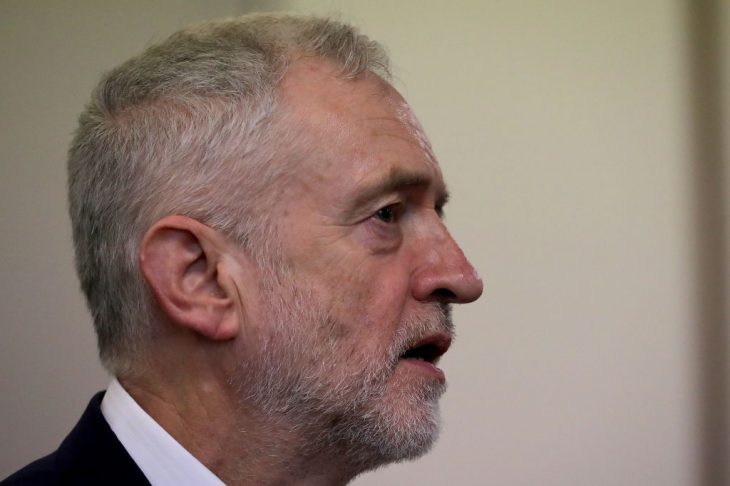Neither of the two resigning MPs directly attacked Jeremy Corbyn’s leadership in their resignation letters, but both have been outspoken critics of the direction he was taking. Both wrote agonised essays about the future of Labour. In a pamphlet, which Hunt had organised, on Labour and Englishness, Reed described a ‘quiet crisis’ in towns and smaller cities across England in which the local institutions, from the high street to the newspaper to the town hall, were all disappearing, and with them regional identity. He diagnosed the Labour Party’s ‘tin ear’ to Englishness. He didn’t speak about the new axis between globalisation and nationalism, the theme of James Forsyth’s cover story this week. But if he had, he might have said that Labour was too far down the wrong side of this axis. That it needed more of what Maurice Glassman used to call “flag and family”. Both Reed’s Copeland seat and Hunt’s Stoke-on-Trent Central fit that description of a ‘quiet crisis’, though for very different reasons. And this should be all the more worrying for Labour.
Copeland, in Cumbria, has a clear identity as a town that powers the rest of the UK, with 10,000 of its jobs reliant on the nuclear industry at Sellafield and a proposed plant to replace it, Moorside, which could provide up to 20,000 new jobs. But it is the most remote constituency in England in terms of distance from Westminster — six and a half hours’ drive from London, five hours by train. The transport links are pretty dire: the Northern rail franchise sends slow and frequently-delayed trains, often with only a couple of carriages, chugging along the coastline from Lancaster and Preston. This is an odd depiction of the ‘Northern Powerhouse’: indeed, the most recent Treasury document on that project forgot to mention Cumbria at all.
Stoke and Copeland share a sense of being neglected, perhaps why both constituencies voted Leave in the EU referendum. Both had energetic Ukip campaigns for their respective by–elections. Both are typical of Labour seats in the North and Midlands which were once described as ‘solid’, but now appear shaky at best. Hunt wrote that ‘time and again, I heard our political motivations questioned as though the party were somehow hiding a secretive anti-English agenda from the public’s scrutiny’.
It would be easy to blame Jeremy Corbyn for last night’s defeat in Copeland – but this quiet crisis predates his leadership by quite a few years, if not decades. Corbyn, says the Labour pollster James Morris, is not the source of the party’s problem, but rather the final straw for voters who were already losing patience:
‘From the point of view of someone who lives on an estate in Hull, his utopian, cosmopolitan, internationalist, anti-military non–patriotic beliefs are all what they already think of the Labour party. Ed Miliband had his own problems, but he wasn’t the personification of everything that was wrong with the Labour party and none of the good things.’
Morris and others have conducted focus groups in constituencies across the party’s heartlands and have found voters running out of reasons to stay with Labour. ‘The only thing that is propping up the party is a social norm, and if that cracks, then it becomes a snowball, and that’s what happened in Scotland,’ says Morris. Another source working with MPs frets that he cannot see the floor to the Labour vote any more. In Copeland, it is retaining voters from the general election at a rate of 65 per cent — in the Oldham vote, that rate was around 80 per cent. Labour once believed voters in Scotland would always stay loyal. After the 2014 referendum, that assumption was proved wrong. Now its MPs are beginning to worry the same will happen in northern England and the Midlands.
Some MPs are trying to work out how to fix the problem. Lisa Nandy, who left the party’s front bench last summer, is the MP for Wigan and has long worried about the disconnect between Labour MPs and the towns they represent. ‘The big cities like Manchester and Liverpool feel very optimistic,’ she says. ‘But for many people in towns like Wigan it doesn’t feel the same at all. We have a real problem in the North and the Midlands because of the rise of Ukip, and I don’t think it’s really do to with Ukip. It’s to do with Labour and people wanting to send Labour a strong message.’
Nandy has identified 50 towns to try to repair the relationship between the people and the party. In Copeland, Labour’s campaign focused on the NHS, often a comfort blanket for Labour when it is worried, but a serious problem locally. When I followed a group of councillors and activists around on the doorstep in Millom, Cumbria, recently, the threat to consultant-led services at the local hospital was something voters in the streets of ex-council houses were very animated about. But then again, those voters were also grumbling about Jeremy Corbyn as Labour leader, telling the canvassers to ‘sort it out’.
Last night’s by-elections show that few in the party have understood the value of simply listening to voters’ concerns; of understanding. I heard one Labourite saying she didn’t want to have a conversation about immigration, even if the voters did. Labour has had plenty of warnings about its support in its heartlands over the years: it just chose to ignore them. At a local level, for instance, I found out that the party’s headquarters held ‘contact rate’ data, working out how many voters in each constituency have been contacted about their voting intention. It made for fairly shocking reading. Some big names (in safe seats) are well-known to have terrible rates, notching up no more than a few dozen in two decades.
Funnily enough, there is a direct correlation between a low contact rate and high Ukip support in individual wards. The Labour Party is slowly and painfully making this connection, but it could be waking up to the problem too late, just before its crumbling support collapses down a hole. The Copeland by-election was enough of a shock, but may yet turn out to be the end of the beginning.
This article, a version of which originally appeared in the Spectator in January, has been updated following Labour’s defeat last night in the Copeland by-election






Comments